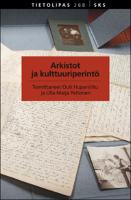Arkistot ja kulttuuriperintö
Contributor(s)
Hupaniittu, Outi (editor)
Peltonen, Ulla-Maija (editor)
Language
FinnishAbstract
The edited volume Archives and the Cultural Heritage focuses on archives as institutions and to their tense relationship with archives as material. These dynamics are discussed in respect of the past, the present, and the future. The focus lies in the mechanisms the Finnish archive institutions have utilised when taking part in forming the cultural heritage and in debating the importance of the private archives in society. Within social sciences and history from the early 1990s onwards, the effects of globalisation have been seen as a new focal point for research. Momentarily, the archives saw the same paradigm shift as the focus of the archival studies proceeded from state to society. This brought forth the notion that the values of society are reflected in the acquisition of archival material. This archival turn draws attention to the archives as entities formed by cultural practices. The volume discusses cultural heritage within Finnish archives with diverse perspectives and from various time periods. The key concepts are cultural heritage and archives – both as institution and as material. Articles review the formation of archival collections spanning from the 19th to the 21st century and highlight that the archives have never been neutral or objective actors; rather, they have always been an active process of remembering and forgetting, a matter of inclusion and exclusion. The focus is on private archives and on the choices that guided the creation of the archives and the cultural perceptions and power structures associated with them. Although private archives have considerable social and research value, and although their material complements the picture of society provided by documentary data produced by public administrations, they have only risen to the theoretical discussions in the 21st century. The authors consider what has happened before the material ends up in the archive, what happens in the archive and what can be deduced from this. It shows how archival solutions manifest themselves, how they have influenced research and how they still affect it. One of the key questions is whose past has been preserved and whose is deemed worthy of preservation. Under what conditions have the permanently preserved documents been selected and how can they be accessed? In addition, the volume pays attention to whose documents have been ignored or forgotten, as well as to the networks and power of the individuals within the archival institution and to the politics of memory. The Archives and the Cultural Heritage is an opening to a discussion on the mechanisms, practices and goals of Finnish archival activities. It challenges archival organisations to reflect on their own operating models and to make visible their own conscious or unconscious choices. It raises awareness of the formation of the Finnish documentary cultural heritage, produces new information about private archives and participates in the scientific debate on the changing significance of archives in society. The volume is related to the Academy of Finland research project “Making and Interpreting National Pasts – Role of Finnish Archives as Networks of Power and Sites of Memory” (no 25257, 2011–2014/2019), University of Turku. Project partners Finnish Literature Society (SKS) and Society of Swedish Literature in Finland (SLS).
Keywords
power; documentary heritage; private archives; archival institutions; archival theory; archival thinkingDOI
10.21435/tl.268ISBN
9789518583854, 9789518583847, 9789518582826, 9789518583854Publisher
Finnish Literature Society / SKSPublication date and place
Helsinki, 2021Imprint
Finnish Literature SocietySeries
Tietolipas, 4Classification
Museology and heritage studies
Folklore studies / Study of myth (mythology)
History
Literary studies: general
Science: general issues


 Download
Download Web Shop
Web Shop